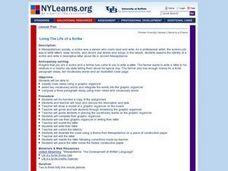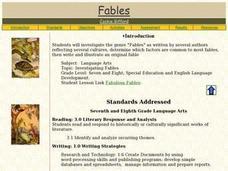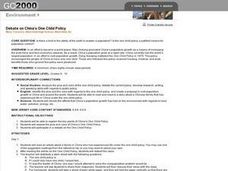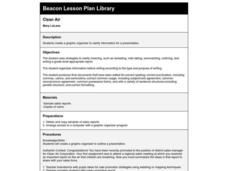West Corporation
Making Inferences – Use Your Mind to Read!
How can you tell if someone is happy? The lesson works with elementary and middle school scholars to activate their schema and pay attention to details to make inferences in their daily lives, poetry, and other literature. Cleverly...
Council for Economic Education
Paper Money of the Sung, Yuan, and Ming Dynasties
Why did the Chinese develop paper money? They were the first society to use paper currency. Learners consider why paper money was more convenient than other mechanisms of trade using a helpful lesson plan, which includes a graphic...
National History Day
More Than Mud and Cooties: The Poetry of World War I Soldiers
Poetry is not just for romance. Teach middle schoolers about soldiers' experiences during World War I with poetry written by the soldiers themselves. The lesson includes a simulation activity, a graphic organizer activity, and a...
Berkeley Lab
Virtual Frog Dissection Kit
Fluffy is one of the most common names for a pet frog. Fluffy, the digitized frog in this dissection kit, opens up quite literally to allow scholars to see what's inside. The basic kit encourages pupils to click on various organs to see...
Curated OER
The Life of George Washington Carver
Second graders investigate historic Americans by researching George Washington Carver. In this famous American biography lesson, 2nd graders complete graphic organizers about George Washington Carver's life while researching the...
Curated OER
Living The Life of a Scribe
Young scholars write a descriptive letter about life in ancient Mesopotamia. Through video streaming, students discover the history of Mesopotamia. They assume the role of a scribe and compose a three paragraph essay using main ideas and...
Curated OER
Ask Questions About a Topic
Students explore reading comprehension by completing a graphic organizer. In this journalism technique lesson, students discuss important questions they can ask about stories they read to improve comprehension. Students identify keywords...
Curated OER
Investigating Fables
Time for a story! Learners of all ages enjoy listening to stories, so read them some common fables and have them work cooperatively to create a fable. Differentiate for varying ability levels by providing sentence frames, graphic...
Curated OER
A More Perfect Union: The Story of Our Constitution
Sit back, relax, and transport to 1787! This lesson on the Constitution begins with guided imagery of the Constitutional Convention. The class reads A More Perfect Union: The Story of Our Constitution in an...
Curated OER
The Big Sneeze
Students participate in a variety of shared reading and writing activities related to the book "The Big Sneeze" by Ruth Brown. They develop a list of farm vocabulary, sequence the events of the story on a graphic organizer, act out...
Curated OER
Debate on China's One Child Policy
High schoolers learn about China's One Child Policy. They read an article about a specific family's experience under the policy (not included) and research and explain the key points of the policy. They assess the pros and cons in a...
Curated OER
Japan Writing Activity
Seventh graders explore the current tensions in Asia by completing a graphic organizer. In this Asian politics lesson, 7th graders examine a Powerpoint slide and news article which gives them the information needed to fill in their...
Curated OER
East Meets West
Students explore the influences of culture in food choices and customs. They compare and contrast information to create a menu using a Web site and Student Writing Center. Suggestions for creating an on-line graphic organizer as well as...
Curated OER
The Call of the Wild
Students read The Call of the Wild, noting its theme of survival. They investigate the book's concepts with word webs, spider maps, or graphic organizers. They conduct a panel discussion on dogs and wolves. They write a letter to the...
Curated OER
Clean Air
High schoolers read sales promotion reports and create a sales promotion summary using information from the report. They develop a graphic organizer to outline their information for a presentation. There is an assessment checklist...
Curated OER
History According to Shakespeare
Students read Shakespeare's, Julius Caesar while identifying a number of literary elements including simile, metaphor, personification, and hyperbole. As a response activity, they simulate a mock trial, and finally, compare and contrast...
Curated OER
A Readers' Theatre for Bringing the Rain to Kapiti Plain
Second graders read and perform a reader's theater version of the story, "Bringing the Rain to Kapiti Plain." They complete a graphic organizer of cause and effect of their part in the story, look up vocabulary words on a dictionary...
Curated OER
Let Your Voice Be Heard
Students explore new ways to communicate through technology by utilizing an internet program. In this reading comprehension instructional activity, students utilize the website voicethread.com to share their thoughts and notes...
Curated OER
Positively Precise Organization
Fourth graders go online to critique the organization of student writing. They access the Yahooligans website to view the writing pieces. They utilize a worksheet imbedded in this plan which guides their scoring.
Curated OER
Comparing Two Poe Classics
Students read and discuss The Black Cat and The Tell-Tale Heart. In this poetry lesson, students construct a Venn diagram to compare and contrast two pieces of literature.
Curated OER
De Vacaciones en Bariloche
Students answer simple questions that do not require much analysis. They answer true/false questions. Students answer multiple choice which would be the best meaning of this word. They use graphic organizers to contrast a cheap vs, a...
Curated OER
Checkmate: The Play's The Thing
Students investigate the Middle Ages and it's relation to the theater. In this acting lesson, students read Arthurian stories form the Middle Ages and practice using vocabulary words from the Medieval Times. Students write a...
CK-12 Foundation
Cannon Simulation
Fire in the hole! Thrill your classes as they see what it's like to fire a cannon ball. Scholars practice aiming a cannon ball by altering first the firing angle, then the velocity, and finally both simultaneously. Can they discover the...
Curated OER
Systems Working Together
Fourth graders practice reading in the content areas (science) in order to explore the interdependence of the body systems. They answer written questions after reading.























